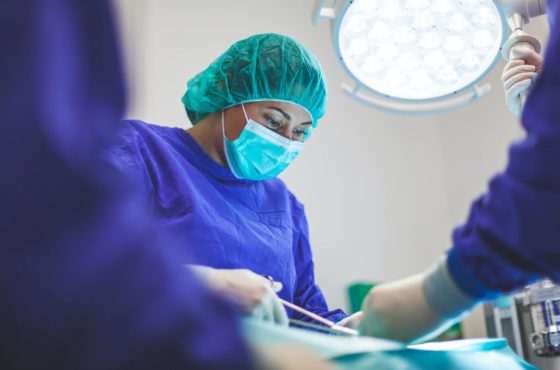More than 1 million hernia repair surgeries are done in the United States each year. However, not all of these procedures are successful.
In fact, the hernia mesh device, which has been the gold standard of hernia treatment has been named in several complaints filed in the court.
According to plaintiffs who have filed a hernia mesh lawsuit, the device has a high failure rate which can cause problems for hernia patients even a few years after their surgery.
What happens when a hernia mesh fails?
According to a study published in the U.S. National Library of Medicine, hernia mesh failure can result in a wide array of minor or even life-threatening medical problems.
What Does it Feel Like When Hernia Mesh Fails?
Hernia mesh failure occurs when the surgical mesh used in your hernia repair surgery failed to serve its purpose — keeping your organs and tissues in place.
At times, this may happen because of a defective hernia mesh, either from a poor design or an incompatible component of a certain hernia mesh product. It may also be due to an error by a surgeon.
Symtpoms of hernia mesh failure can occur anywhere between weeks and even several years after hernia repair surgery.
Some of its most common syptoms may include chronic pain, continuing infections, bulging, hernia recurrence, and even impotence.
When a hernia surgical mesh fails and ends up causing more problems in a patient, a surgeon may have to perform revision surgery, or a surgery done to remove the defective mesh so as to avoid fruther complications such as scarring, bowel obstruction, infection, and hernia recurrence.
Hernia Mesh Failure Symptoms
Pain. The most common symptom of mesh failure is pain, which most often comes in the form of abdominal pain. In some cases, this pain is felt at the site of implant.
Pain from hernia mesh failure may be caused by inflammation, nerve entrapment, or excessive scar tissue. Pain may also range from mild to severe or chronic.
Although it is perfectly normal to feel a certain amount of pain following your hernia repair surgery, chronic pain that persists may be a sign of other mesh-related complications and needs immediate medical attention.
Bulging. Bulging at the site of the hernia mesh implant may indicate that the surgical hernia mesh may have moved out of place or migrated, and may also be a sign of an infection or hernia recurrence.
Infection. A hernia mesh infection occurs when there is a growth of bacteria on the site of implant, which can cause fever, swelling around the surgical site, flu-like symptoms, and other health problems, depending on where it occurs in the body.
Bowel Obstruction. Bowel obstruction may be due to an adhesion, which occurs when scar tissue adheres to the mesh implant. As such, the defective hernia mesh along the abdominal wall may cause constipation, bloating, and vomiting. In cases when there is a complete obstruction of the bowel, it may be necessary to remove it.
Impotence. Impotence and other sexual problems such as erectile dysfunction, difficulty reaching orgasm, and changes in sexual functions are more common in men who underwent inguinal hernia repair with surgical mesh.
This may be due to a number of reasons, including a patient’s spermatic cord adhering on the device or a nerve getting caught in the defective mesh. Some patients also reported other related symptoms like mild pain, swelling, and a reduction in testicle size.
According to a study published in the National Center for Biotechnology Information, experiencing hernia mesh complications may decrease blood supply to the testicles, which can potentially lead to testicular removal.
Lack of Energy. Lack of energy or the feeling of being tired or fatigued after a patient has recovered from the hernia surgery may not be normal. Lack of energy may be indicative of the patient’s body not adjusting well to the hernia mesh device.
For instance, the body of a patient may be having an immune response as a reaction to the foreign object, which, in this case, is the hernia mesh.
If you are experiencing chronic fatigue and you recently had a hernia surgery, it is recommended that you seek medical attention quickly.
Hernia Recurrence. When hernia mesh failure occurs, the device may break or move from its original place, which can result in a recurrent hernia.
A wide array of mesh-related complications, including adhesion, mesh migration, and bowel perforation may also cause a hernia to come back.
What Causes Hernia Mesh Failure?
There is no one factor that causes a surgical hernia mesh to fail, as it most often occurs subsequent to a combination of different mesh-related complications. Other reasons may also include a defective design of a particular hernia mesh product and a patient’s preexisting medical problems.
The following are some hernia mesh complications which can result in hernia mesh failure:
- mesh shrinkage
- breakage
- migration
- hernia mesh rejection
- hernia mesh infection
What are the Chances of Your Hernia Mesh Failing?
A 2016 report published in the Journal for the American Medical Association (JAMA) that observed patient experiences five years following hernia mesh surgery found that mesh failure rate was 5.6% for open hernia repair and 3.7% among patients who had laparoscopic hernia repair.
The mesh failure rate was linked to complications including bowel perforation, bowel obstruction, and bleeding.
Although it is still difficult to arrive at one fixed mesh failure rate due to available data having conflicting findings, factors such as the type of surgery, the surgeon’s experience, and the type of mesh used may all be considered as factors of hernia recurrence rates.
Have Hernia Mesh Failures Led to Product Recalls?
The U.S. Food and Drug Administration (FDA) has received a number of adverse event reports associated with hernia mesh products, which prompted the regulating agency to initiate device recalls for hernia mesh manufacturers and their potentially faulty surgical mesh devices.
As such, a number of brands and mesh types were found to have higher failure rates compared to others. Some of these products have also been named in hernia mesh lawsuits today.
For instance, in May 2016, Ethicon’s Physiomesh Flexible Composite Mesh was pulled from the market after two different hernia studies found that the product had higher rates of hernia recurrence and mesh failure.
According to patients, these products had poor designs, were defective, and had mesh failure rates that were higher than expected.
The U.S. FDA also announced a number of hernia mesh recalls with reasons ranging from poor performance to packaging errors to adverse events. Other companies which were also targeted by the FDA included C.R. Bard, Ethicon Inc., and Atrium Medical Corporation.
Should You Have Your Hernia Mesh Removed?
Complications due to a defective hernia mesh device can range from mild to moderate or severe. Regardless of how mild or severe, a hernia mesh that has failed will most likely need revision surgery or removal of the device.
For a hernia mesh victim, additional surgeries may be necessary to avoid further complications, but it also means costly hospital bills. Not to mention, revision surgeries may have their benefits, but as with any other operations, they also come with a number of risks.
If you or a loved one suffered from hernia mesh failure and other injuries or complications following a hernia mesh surgery, it is important to know that you are not alone. Many victims of these faulty products have also experienced similar problems.
A number of them have joined the legal battle against the manufacturers of these faulty medical devices which have caused serious injuries in patients.



